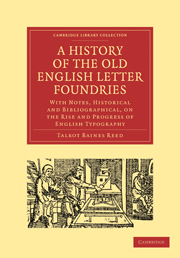 A History of the Old English Letter Foundries
A History of the Old English Letter Foundries Book contents
- Frontmatter
- PREFACE
- Contents
- LIST OF ILLUSTRATIONS
- Introductory Chapter: THE TYPES AND TYPE FOUNDING OF THE FIRST PRINTERS
- Chap. 1 THE ENGLISH TYPE BODIES AND FACES
- Chap. 2 THE LEARNED, FOREIGN AND PECULIAR CHARACTERS
- Chap. 3 THE PRINTER LETTER-FOUNDERS, FROM CAXTON TO DAY
- Chap. 4 LETTER FOUNDING AS AN ENGLISH MECHANICAL TRADE
- Chap. 5 THE STATE CONTROL OF ENGLISH LETTER FOUNDING
- Chap. 6 THE OXFORD UNIVERSITY FOUNDRY
- Chap. 7 THE STAR CHAMBER FOUNDERS, AND THE LONDON POLYGLOT
- Chap. 8 JOSEPH MOXON
- Chap. 9 THE LATER FOUNDERS OF THE 17TH CENTURY
- Chap. 10 THOMAS AND JOHN JAMES
- Chap. 11 WILLIAM CASLON
- Chap. 12 ALEXANDER WILSON
- Chap. 13 JOHN BASKERVILLE
- Chap. 14 THOMAS COTTRELL
- Chap. 15 JOSEPH AND EDMUND FRY
- Chap. 16 JOSEPH JACKSON
- Chap. 17 WILLIAM MARTIN
- Chap. 18 VINCENT FIGGINS
- Chap. 19 THE MINOR FOUNDERS OF THE 18TH CENTURY
- Chap. 20 WILLIAM MILLER
- Chap. 21 THE MINOR FOUNDERS FROM 1800 TO 1830
- CHRONOLOGICAL TABLE OF ENGLISH LETTER-FOUNDERS' SPECIMENS NOTED IN THIS WORK 1665–1830
- LIST OF THE PRINCIPAL AUTHORITIES CONSULTED OR REFERRED TO
- INDEX
- Plate section
Chap. 10 - THOMAS AND JOHN JAMES
Published online by Cambridge University Press: 05 August 2011
- Frontmatter
- PREFACE
- Contents
- LIST OF ILLUSTRATIONS
- Introductory Chapter: THE TYPES AND TYPE FOUNDING OF THE FIRST PRINTERS
- Chap. 1 THE ENGLISH TYPE BODIES AND FACES
- Chap. 2 THE LEARNED, FOREIGN AND PECULIAR CHARACTERS
- Chap. 3 THE PRINTER LETTER-FOUNDERS, FROM CAXTON TO DAY
- Chap. 4 LETTER FOUNDING AS AN ENGLISH MECHANICAL TRADE
- Chap. 5 THE STATE CONTROL OF ENGLISH LETTER FOUNDING
- Chap. 6 THE OXFORD UNIVERSITY FOUNDRY
- Chap. 7 THE STAR CHAMBER FOUNDERS, AND THE LONDON POLYGLOT
- Chap. 8 JOSEPH MOXON
- Chap. 9 THE LATER FOUNDERS OF THE 17TH CENTURY
- Chap. 10 THOMAS AND JOHN JAMES
- Chap. 11 WILLIAM CASLON
- Chap. 12 ALEXANDER WILSON
- Chap. 13 JOHN BASKERVILLE
- Chap. 14 THOMAS COTTRELL
- Chap. 15 JOSEPH AND EDMUND FRY
- Chap. 16 JOSEPH JACKSON
- Chap. 17 WILLIAM MARTIN
- Chap. 18 VINCENT FIGGINS
- Chap. 19 THE MINOR FOUNDERS OF THE 18TH CENTURY
- Chap. 20 WILLIAM MILLER
- Chap. 21 THE MINOR FOUNDERS FROM 1800 TO 1830
- CHRONOLOGICAL TABLE OF ENGLISH LETTER-FOUNDERS' SPECIMENS NOTED IN THIS WORK 1665–1830
- LIST OF THE PRINCIPAL AUTHORITIES CONSULTED OR REFERRED TO
- INDEX
- Plate section
Summary
Thomas james was the son of the Rev. John James, vicar of Basingstoke. He served his apprenticeship to Robert Andrews, but quitted his service prior to the year 1710, in order to start business on his own account. Impressed, doubtless, with the present low condition of the art in England, and lacking the skill to regenerate it by his own labour, he determined to visit Holland and procure for himself, from that famous typographical market, the matrices and moulds necessary for establishing a successful foundry in London. The characteristic letters in which he describes this expedition to his brother are given by Rowe Mores, and present so instructive and entertaining a picture of the Dutch type-founders of the day, that we are tempted to copy them in extenso.
“Rotterdam, 22 June 1710.—I have been with all the Letter Founders in Amsterdam, and if I would have given — for matrices, could not persuade any of'em but the last I went to, to part with any. So far from it that it was with much ado I could get them to let me see their business. The Dutch letter founders are the most sly and jealous people that ever I saw in my life. However this last man (being as I perceived by the strong perfume of Geneva waters a most profound sot) offers to sell me all his house for about — I mean the matrices: for the punchions with them he will not sell for any money.[…] ”
- Type
- Chapter
- Information
- A History of the Old English Letter FoundriesWith Notes, Historical and Bibliographical, on the Rise and Progress of English Typography, pp. 212 - 231Publisher: Cambridge University PressPrint publication year: 2010First published in: 1887


